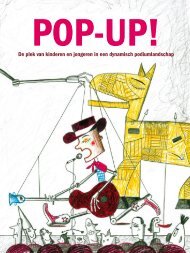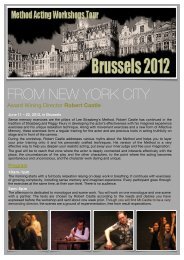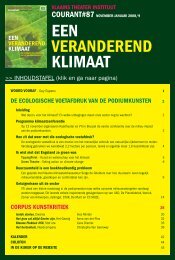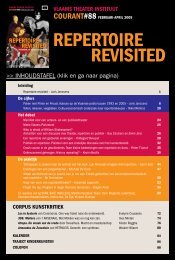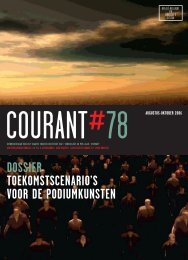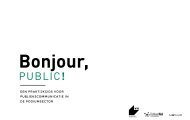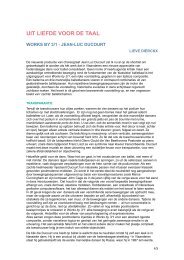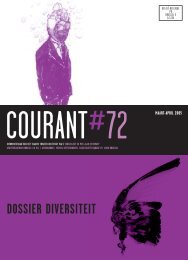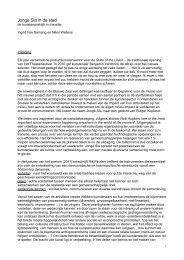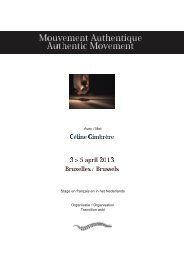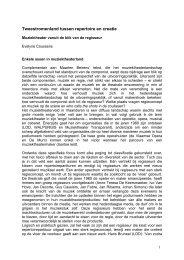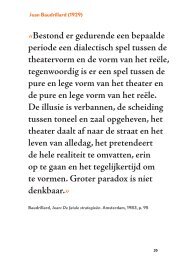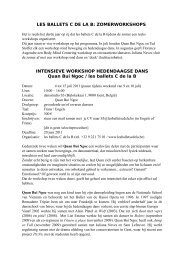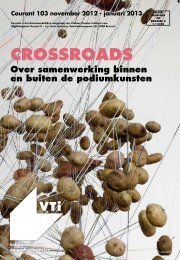You also want an ePaper? Increase the reach of your titles
YUMPU automatically turns print PDFs into web optimized ePapers that Google loves.
It is with this short prologue that Tom Jansen introduces the spoken<br />
word into the performance. The start of the story of Larfken<br />
is already upset after several sentences and lapses into an abstract<br />
baby-talk, the sort of nonsense adults are in the habit of coming<br />
out with over the baby’s cot. The atmosphere is immediately<br />
established:<br />
Little Larva, Larva wee<br />
Is a butterfly what you will be?<br />
Yesssssssssssssssssssss!<br />
Little Larva, Larva son<br />
And do you know the way it’s done?<br />
Nooooooooooooooooooo!<br />
Larva, Larva, little nit<br />
Scratch your skin all to bits!<br />
Oooooooooooooooooooo!<br />
josse de pauw<br />
‘And then the music pierces to the bone,’ is the following stage<br />
direction, and that is exactly what happens. While the actors<br />
describe how the royal baby came into the world, the sounds of<br />
woodwind and brass, percussion, electric guitar, vibraphone,<br />
keyboards, bass and a female voice resound through the fairytale<br />
narration. Lyrical phrases, melancholy reflections on the birth<br />
and the constantly repeated ‘rock-a-bye, rock-a-bye’ set the tone.<br />
The birth and the first signs of life are cloyingly described.<br />
The child grows up perfectly and is loved by everyone until it<br />
learns to speak. ‘I’, is its first word. And the second and third: ‘I.<br />
I. II. IIIIIIII…’ Dirk Roofthooft goes on endlessly bellowing the<br />
word. Gradually other words appear and the first sentences take<br />
shape: ‘I am the world. I want. Give me what is mine.’ The eagerly<br />
expected child turns out to be a pain in the neck, obsessed with<br />
such a hunger for power that nothing less than the royal throne<br />
is good enough for him.<br />
Whereas during the beginning section of the play the three<br />
actors simply sat on chairs amongst the musicians, as speaking<br />
voices in the orchestra, from the moment Larf ascends the throne<br />
42 / Kritisch Theater Lexicon - 14 e - August 2001<br />
artistic development: de pauw’s way and weg<br />
they separate themselves from the group. They put on wrought<br />
iron adornments by Tinel and each climbs one of the huge<br />
thrones high above the big band. Once there they start to speak:<br />
on the importance of the threat of an enemy for the smooth functioning<br />
of the state, on the guilt of the corrupt woman, on what<br />
lives and what does not, on the creation of flowery meadows and<br />
on the genesis of mankind. The theory of natural selection which<br />
they support leads to the burning of a monkey figure while the<br />
kings laugh and shout (‘Ape face! Ugly mug! Get back up your<br />
tree!). From this point on the political undertone in the play<br />
becomes paramount. It is not only that power as a universal fact<br />
becomes the point of the play, but its practical consequences are<br />
also examined.<br />
In a r<strong>het</strong>orically sophisticated speech the kings address the people:<br />
‘Ladies and gentlemen, my dear people, Jean, Jeanine and<br />
Sigiswald, chers compatriotes, mesdames, messieurs. Things are<br />
going well. Very well. We have little or no reason to complain.’<br />
This is followed by a description of just how good things are,<br />
how fine life can be and how cleverly we are able to protect ourselves<br />
from all manner of calamity. The state is an oasis of good<br />
fortune and no burglar, war or storm can harm it. The public,<br />
which is initially invited to join in this contemplation of all the<br />
nice things they are able to experience everyday, are little by little<br />
also given more unpleasant morsels to digest. The rulers refer<br />
increasingly often to the misery outside, the villains and goodfor-nothings<br />
who do not know how to organise their own lives.<br />
And then comes the dénouement:<br />
We have ever been an hospitable and helpful people.<br />
But if they loom up out of the desert in their hordes to settle<br />
here in our oasis, if they cross the great waters in their rickety<br />
ships to pitch their tents here on our shores, if, like Icarus, they<br />
start to sew on wings and flap them wildly about,<br />
to fly up towards our sun…<br />
Then we should not stand silently looking on!<br />
…<br />
It is not our fault that others appear incapable of shaking off<br />
the ape!<br />
Then, when all three of them reel off ‘The Lion of Flanders’ word<br />
by word, no doubt is left about <strong>De</strong> <strong>Pauw</strong>’s intentions. Certainly<br />
43 / Kritisch Theater Lexicon - 14 e - August 2001



